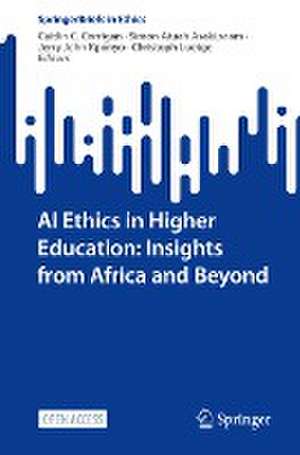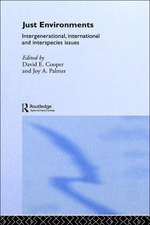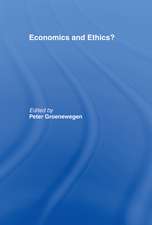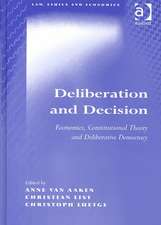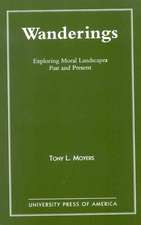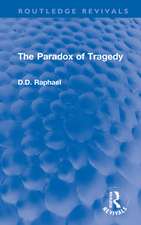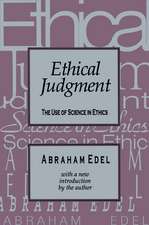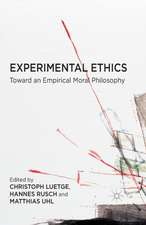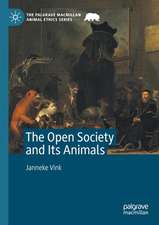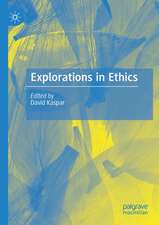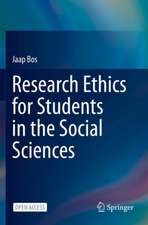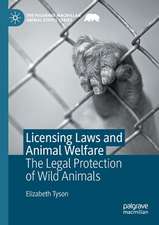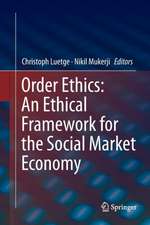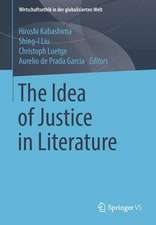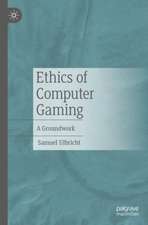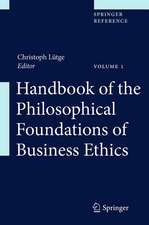AI Ethics in Higher Education: Insights from Africa and Beyond: SpringerBriefs in Ethics
Editat de Caitlin C. Corrigan, Simon Atuah Asakipaam, Jerry John Kponyo, Christoph Luetgeen Limba Engleză Paperback – 21 ian 2023
Din seria SpringerBriefs in Ethics
-
 Preț: 84.28 lei
Preț: 84.28 lei -
 Preț: 370.87 lei
Preț: 370.87 lei -
 Preț: 337.39 lei
Preț: 337.39 lei -
 Preț: 353.67 lei
Preț: 353.67 lei -
 Preț: 370.87 lei
Preț: 370.87 lei -
 Preț: 401.60 lei
Preț: 401.60 lei -
 Preț: 466.89 lei
Preț: 466.89 lei -
 Preț: 337.49 lei
Preț: 337.49 lei -
 Preț: 372.37 lei
Preț: 372.37 lei -
 Preț: 403.89 lei
Preț: 403.89 lei -
 Preț: 371.63 lei
Preț: 371.63 lei -
 Preț: 372.00 lei
Preț: 372.00 lei - 15%
 Preț: 454.10 lei
Preț: 454.10 lei -
 Preț: 414.72 lei
Preț: 414.72 lei -
 Preț: 470.51 lei
Preț: 470.51 lei - 15%
 Preț: 453.97 lei
Preț: 453.97 lei -
 Preț: 371.63 lei
Preț: 371.63 lei -
 Preț: 370.50 lei
Preț: 370.50 lei -
 Preț: 371.63 lei
Preț: 371.63 lei -
 Preț: 469.35 lei
Preț: 469.35 lei -
 Preț: 350.81 lei
Preț: 350.81 lei -
 Preț: 371.63 lei
Preț: 371.63 lei -
 Preț: 171.27 lei
Preț: 171.27 lei -
 Preț: 469.18 lei
Preț: 469.18 lei -
 Preț: 468.59 lei
Preț: 468.59 lei -
 Preț: 468.80 lei
Preț: 468.80 lei -
 Preț: 470.68 lei
Preț: 470.68 lei -
 Preț: 171.85 lei
Preț: 171.85 lei -
 Preț: 255.02 lei
Preț: 255.02 lei -
 Preț: 255.18 lei
Preț: 255.18 lei -
 Preț: 401.60 lei
Preț: 401.60 lei -
 Preț: 403.67 lei
Preț: 403.67 lei - 15%
 Preț: 455.25 lei
Preț: 455.25 lei -
 Preț: 404.26 lei
Preț: 404.26 lei - 15%
 Preț: 455.25 lei
Preț: 455.25 lei -
 Preț: 467.10 lei
Preț: 467.10 lei -
 Preț: 367.84 lei
Preț: 367.84 lei -
 Preț: 401.97 lei
Preț: 401.97 lei -
 Preț: 369.17 lei
Preț: 369.17 lei
Preț: 254.80 lei
Nou
Puncte Express: 382
Preț estimativ în valută:
48.76€ • 50.93$ • 40.43£
48.76€ • 50.93$ • 40.43£
Carte tipărită la comandă
Livrare economică 11-25 februarie 25
Preluare comenzi: 021 569.72.76
Specificații
ISBN-13: 9783031230349
ISBN-10: 3031230345
Pagini: 101
Ilustrații: V, 101 p. 11 illus., 10 illus. in color.
Dimensiuni: 155 x 235 mm
Greutate: 0.16 kg
Ediția:1st ed. 2023
Editura: Springer International Publishing
Colecția Springer
Seria SpringerBriefs in Ethics
Locul publicării:Cham, Switzerland
ISBN-10: 3031230345
Pagini: 101
Ilustrații: V, 101 p. 11 illus., 10 illus. in color.
Dimensiuni: 155 x 235 mm
Greutate: 0.16 kg
Ediția:1st ed. 2023
Editura: Springer International Publishing
Colecția Springer
Seria SpringerBriefs in Ethics
Locul publicării:Cham, Switzerland
Notă biografică
Caitlin Corrigan: As Executive Director for the IEAI, Dr. Corrigan is responsible for the development and coordination of all IEAI research and administrative activities. Additionally, she works closely with the IEAI Director to craft the IEAI’s agenda, develop strategic partnerships for the institute, and to enhance our academic network. She holds a Ph.D. in Public and International Affairs from the University of Pittsburgh. Her research interests include good governance, sustainable development, and corporate social responsibility, particularly in developing country settings. She has over ten years of experience in designing and implementing research and data collection, developing and managing research projects, and coordinating funding proposals. She has also conducted field-based research in Southern Africa with a focus on CSR, natural resource management, and community development. She has published several articles in academic journals and has worked as a consultant for local and international NGOs though the Research Group for Sustainable Impacts (RG-SI), producing data collection and evaluation systems for organizations, conducting statistical data analysis, and generating policy relevant research and reports.
Jerry John Kponyo: Prof. Jerry John Kponyo is Dean of the Quality Assurance and Planning Office of the Kwame Nkrumah University of Science and Technology (KNUST) under Vice-Chancellor’s Office. He is Former Dean of the Faculty of Electrical and Computer Engineering, KNUST. Prior to becoming Dean of the Faculty of Electrical and Computer Engineering, he was Head of Electrical Engineering Department. He is currently Principal Investigator and Scientific Director of the Responsible AI Lab, a 1 Million Canadian Dollars project sponsored by IDRC and GIZ. He is also Deputy Project Lead of the KNUST Engineering Education Project (KEEP), a 5.5 Million Dollar Africa Center of Excellence (ACE) Impact project sponsored by the World Bank with a focus on Digital Development and Energy. He is Co-Founder of the Responsible AI Network (RAIN) Africa, which is a collaborative effort between KNUST and TUM Germany. Between 2016 and 2019, he was Visiting Professor at ESIGELEC, France, on a staff mobility program where he taught postgraduate courses in Business Intelligence and conducted research with staff of ESIGELEC. He has done extensive research in IoT, intelligent systems, and AI and currently leads the Emerging Networks and Technologies Research Laboratory at the Faculty of Electrical and Computer Engineering, KNUST, which focuses on digital development technologies research. His Ph.D. research focused on applying AI to solving a traffic problem in Vehicular Ad Hoc Networks (VANETs). He has published over 50 articles in refereed journals and conference proceedings. He is Member of the Ghana Institution of Engineers. He is currently Coordinator of the West Africa Sustainable Engineering Network for Development(WASEND).
Christoph Lütge: Prof. Lütge (b. 1969) conducts research in the field of business and corporate ethics. He explores regulatory ethics—ethical behavior in the socio-economic framework of the globalized world. The role of competition and the incentives created by frameworks are also examined, as is the adequacy of ethical categories. After studying business informatics and philosophy (doctorate 1999), he became Research Associate at Chair of Philosophy and Economics at Munich’s Ludwig Maximilian University. He also completed his lecturer qualification (2005) at the same institution. He has worked as a researcher in Pittsburgh, San Diego, and Venice. From 2007 to 2010, he served as Acting Professor at the Universities of Witten/Herdecke and Braunschweig. Since 2010, he has held the position of Peter Löscher Professor of Business Ethics at TUM.
Jerry John Kponyo: Prof. Jerry John Kponyo is Dean of the Quality Assurance and Planning Office of the Kwame Nkrumah University of Science and Technology (KNUST) under Vice-Chancellor’s Office. He is Former Dean of the Faculty of Electrical and Computer Engineering, KNUST. Prior to becoming Dean of the Faculty of Electrical and Computer Engineering, he was Head of Electrical Engineering Department. He is currently Principal Investigator and Scientific Director of the Responsible AI Lab, a 1 Million Canadian Dollars project sponsored by IDRC and GIZ. He is also Deputy Project Lead of the KNUST Engineering Education Project (KEEP), a 5.5 Million Dollar Africa Center of Excellence (ACE) Impact project sponsored by the World Bank with a focus on Digital Development and Energy. He is Co-Founder of the Responsible AI Network (RAIN) Africa, which is a collaborative effort between KNUST and TUM Germany. Between 2016 and 2019, he was Visiting Professor at ESIGELEC, France, on a staff mobility program where he taught postgraduate courses in Business Intelligence and conducted research with staff of ESIGELEC. He has done extensive research in IoT, intelligent systems, and AI and currently leads the Emerging Networks and Technologies Research Laboratory at the Faculty of Electrical and Computer Engineering, KNUST, which focuses on digital development technologies research. His Ph.D. research focused on applying AI to solving a traffic problem in Vehicular Ad Hoc Networks (VANETs). He has published over 50 articles in refereed journals and conference proceedings. He is Member of the Ghana Institution of Engineers. He is currently Coordinator of the West Africa Sustainable Engineering Network for Development(WASEND).
Christoph Lütge: Prof. Lütge (b. 1969) conducts research in the field of business and corporate ethics. He explores regulatory ethics—ethical behavior in the socio-economic framework of the globalized world. The role of competition and the incentives created by frameworks are also examined, as is the adequacy of ethical categories. After studying business informatics and philosophy (doctorate 1999), he became Research Associate at Chair of Philosophy and Economics at Munich’s Ludwig Maximilian University. He also completed his lecturer qualification (2005) at the same institution. He has worked as a researcher in Pittsburgh, San Diego, and Venice. From 2007 to 2010, he served as Acting Professor at the Universities of Witten/Herdecke and Braunschweig. Since 2010, he has held the position of Peter Löscher Professor of Business Ethics at TUM.
Textul de pe ultima copertă
This open access book tackles the pressing problem of integrating concerns related to Artificial Intelligence (AI) ethics into higher education curriculums aimed at future AI developers in Africa and beyond. For doing so, it analyzes the present and future states of AI ethics education in local computer science and engineering programs. The authors share relevant best practices and use cases for teaching, develop answers to ongoing organizational challenges, and reflect on the practical implications of different theoretical approaches to AI ethics. The book is of great interest to faculty members, researchers, and students in the fields of artificial intelligence, computer science, mathematics, computer engineering, and related areas, as well as higher education administration.
Caracteristici
This book is open access, which means that you have free and unlimited access First of its kind to cover the increasingly important issue of teaching AI ethics early in academics Brings together a group of scholars to discuss the issue of bring AI ethics into the classroom Deals with AI ethics in the African context, particularly as it pertains to educating future AI developers
